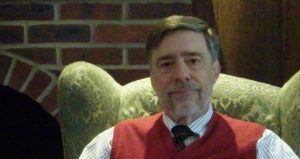
In ch. 11 of How To Pray, we move from letters written by a devil to Lewis’ kind and personal letters to “an American lady.” The Editor, Zack Kincaid, pieces together selections from Letters to an American Lady, and arranges them in a manner that works well. By this time in Lewis’s life – he was in his early fifties – he had worked through the various problems that Christians commonly have with their private prayer life, and he provides helpful, understanding, and insightful assistance.
Lewis discourages the approach of a checklist of rules for our prayer life. He recognizes that there is more going on than some mere religious procedure. Just as many factors can come into play in a relationship between people, so it is in our relationship with God. Prayer should be considered an art, and, as with an artistic undertaking, one adapts fundamental principles to the subject at hand.
What principles do we see Lewis applying here? First, that cycle of prayer which Lewis expounds elsewhere – as, e.g., in his poem “Prayer” – which recognizes God’s role in our praying. Next, there is the effect of our natural condition upon our prayers. If we are ill or over-tired, we should make an allowance for that. God does; he made us this way. Then, there is the whole business of dryness in prayer and how we can misjudge it. Closely touching this issue is that ever-present concern Lewis has for being in touch with Reality in our prayers: it is more important that we are actually in God’s presence, than that we feel we are there. We also find here the importance of living in the present as an aid to our faith and our ability to be thankful and joyful in prayer.
There is more. But underlying it all is the warm and lovely atmosphere of Lewis’ correspondence. He is so friendly, so practical, so encouraging. Is Lewis such a good spiritual counselor because he was such a genius? Or was it because his heart was so true, so zealous for his Lord? Well, we know that spiritual truth is spiritually discerned (I Cor. 2:14). A bit of genius helps, but it is not the primary prerequisite. When it comes down to it, Lewis helps our prayer life, not because he was so smart, but because he is right down there in the trenches with us, as he himself seeks to know and live in the presence of God.
Reference: C. S. Lewis, How To Pray: Reflections and Essays, (New York, HarperOne, 2018), ISBN-13: 978-0062847133.
————————–
Please note that the content and viewpoints of Rev. Beckmann are his own and are not necessarily those of the C.S. Lewis Foundation. We have not edited his writing in any substantial way and have permission from him to post his content.
————————–
 The Rev. David Beckmann has for many years been involved in both the Church and education. He helped to start a Christian school in South Carolina, tutored homeschoolers, and has been adjunct faculty for both Covenant College and the University of Tennessee, Chattanooga. He founded the C.S. Lewis Society of Chattanooga in 2005. He has spoken extensively on C.S Lewis, and was the Director of the C.S Lewis Study Centre at The Kilns from 2014-2015. He is currently a Regional Representative for the C.S. Lewis Foundation in Chattanooga.
The Rev. David Beckmann has for many years been involved in both the Church and education. He helped to start a Christian school in South Carolina, tutored homeschoolers, and has been adjunct faculty for both Covenant College and the University of Tennessee, Chattanooga. He founded the C.S. Lewis Society of Chattanooga in 2005. He has spoken extensively on C.S Lewis, and was the Director of the C.S Lewis Study Centre at The Kilns from 2014-2015. He is currently a Regional Representative for the C.S. Lewis Foundation in Chattanooga.